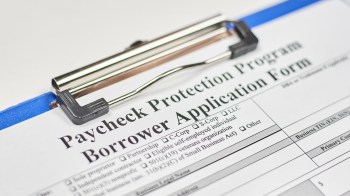Growing plankton for the carbon market
KAI RYSSDAL: This might not be the most politic thing to say — and we’re not the first to point it out. But there are business opportunities aplenty as the planet gets warmer. While Congress tries to figure out how to pass some kind of climate change law, entrepreneurs are cashing in.
They’re selling pollution credits to help companies balance out their ecological footprints. For the most part those credits have been issued on dry land. Now, one company’s taking the concept out to sea. From the Marketplace Sustainability Desk, Alex Schmidt has more.
Alex Schmidt: In Broward Marine, Fort Lauderdale, the Weather Bird II research vessel is about to set out on a pioneering scientific journey. Once the ship gets out to sea, the crew will dump tens of tons of iron into the water. That iron will create a plankton bloom that the crew will observe over its entire 4-6 month lifecycle.
A company called Planktos owns the Weather Bird II. Planktos is hoping that the plants will reduce CO2 in the atmosphere, the same way reforestation projects do on land.
Michael Bailey is the ship manager of the Weather Bird II. He says that saving the environment isn’t the expedition’s only goal.
Michael BAILEY: There’s many times in my life I’ve looked and said, “Is there some way that people actually benefit, is there some way that people can profit from actually helping save the environment?” The best thing is to have a profit motive behind it all to make people get behind the program and understand we can all benefit from this.
Planktos is a carbon-offset producer. It finds ways to reduce carbon dioxide in the atmosphere — by planting forests, for example. Every ton of CO2 that Planktos reduces becomes a commodity that can be sold on.
Companies who want to compensate for polluting can buy those tons, rather than cutting their emissions themselves. Europeans have been doing this for years, thanks to their adherence to the Kyoto Treaty.
There’s no regulated trading program for carbon offsets in the U.S. But there are plenty of companies and individuals who’d like to buy them. California Gov. Arnold Schwarzenegger, for example. Every time he flies in his jet he buys offsets in a redwood forest.
Josh Margolis is co-CEO of Cantor CO2E, a brokerage company of Cantor Fitzgerald. CO2E matches up buyers and sellers of carbon offsets. Margolis says it won’t be long before trading in carbon offsets becomes big business here.
Josh MARGOLIS: They’re going to impose carbon constraints on us in the U.S. That has not occurred yet, but as sure as I’m going to get up tomorrow morning — it’s not a guarantee, I think I will — we’re going to have carbon mandates. Very smart economists have concluded that the world carbon market was $11 billion in 2005, and they’ve projected that in 2008 it’s going to be $100 billion.
No one knows how an offset trading regime might work in the U.S. With such big numbers involved, the government will certainly want some control. Alex Farrell is a professor of energy and resources at UC Berkeley. He says it’s hard to know how federal agencies might regulate an American carbon reduction scheme.
Alex FARRELL: A good example is agriculture. There are things that farmers and other producers can do to actually reduce greenhouse gas emissions from agriculture. If they do this, can they sell those emission-reduction credits to the electric power industry, or not? These are key questions that will determine the size and the value of the emission-reduction credit market, and these are things that we just don’t know how they’re gonna work out in law or regulation yet.
Farrell says government involvement could end up working against an offset trading scheme. Federal regulation could push companies to cut their own emissions, rather than buy offsets.
Anselm Doering is CEO of EcoLogic Solutions. His company sells ecologically-friendly materials to businesses. He says polluters could save money if they cut their emissions themselves.
Anselm DOERING: For industries that are doing the carbon emission offsets, it’s an expense, and they can continue to pollute maybe as they were. So in that sense it’s a bit of a placebo effect. There are things that immediately they could do today, or starting yesterday, in-house to reduce their carbon imprint.
In Fort Lauderdale, the Weather Bird II is preparing to depart. Planktos is making a big bet that both business and government will sign up to an offset trading scheme. It’s hoping that out on the ocean, it’ll find a way to turn green into gold.
In Fort Lauderdale, I’m Alex Schmidt for Marketplace.
There’s a lot happening in the world. Through it all, Marketplace is here for you.
You rely on Marketplace to break down the world’s events and tell you how it affects you in a fact-based, approachable way. We rely on your financial support to keep making that possible.
Your donation today powers the independent journalism that you rely on. For just $5/month, you can help sustain Marketplace so we can keep reporting on the things that matter to you.


















